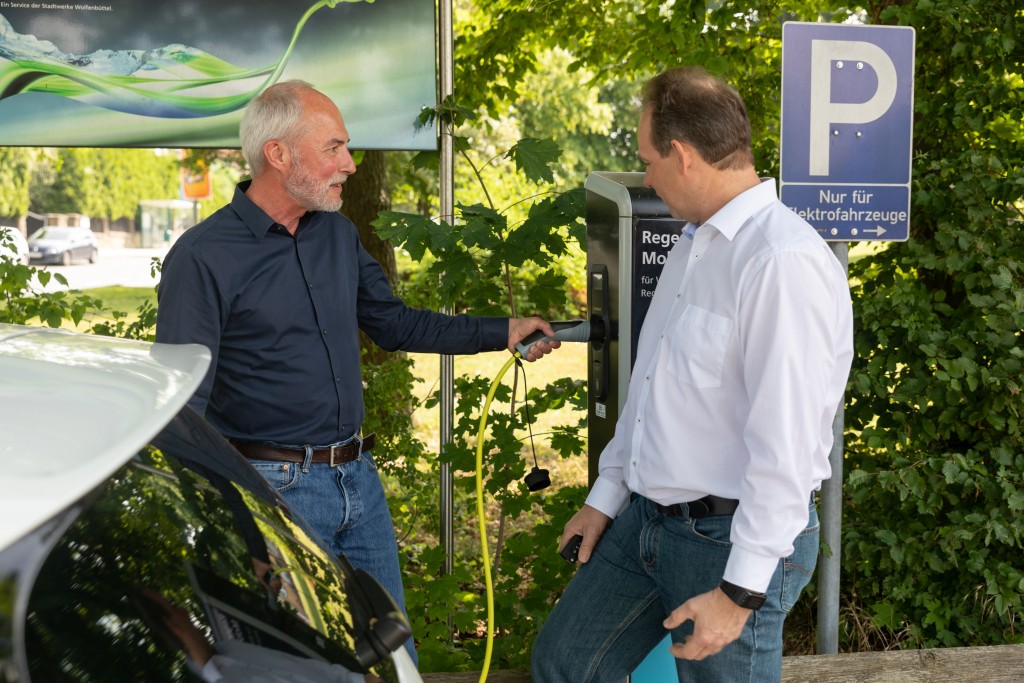Energy and mobility are important areas – economically, socially, ecologically. In this
interview, the professors Gert Bikker and Thomas Cerbe explain why the research area "Intelligent
Systems for Energy and Mobility" has such a high value at Ostfalia. And they discuss in which
projects they shape the developments and why their teaching also benefits from the research.
Professor Bikker, Professor Cerbe, at Ostfalia research activities in the fields of energy and
mobility play a major role. What distinguishes your research area from the others?
Gert Bikker: It is true that the topics of energy and mobility are also strongly represented in
other research areas. There our scientists deal primarily with the technical development of
components and sub-systems. We, on the other hand, consider it rather in overarching interactions:
Our job is to adroitly combine these subsystems, also through informational systems and
digitisation – in order to arrive at new functions.
Thomas Cerbe: E-carsharing is a good example to illustrate this. Carsharing is a system of
communication that combines sophisticated technologies with one another from GPS to digitisation.
It offers people the opportunity to share a vehicle and use it as needed – that’s intelligent
mobility. And what happens during the time the vehicles are not required? Then the fleet, which has
a lot of storage at its disposal, can supply excess energy into the network and thus become an
energy supplier. Consequently, we combine an intelligent system for mobility with an intelligent
system for energy.
Which requirements must be met in order for such a system to succeed?
Thomas Cerbe: We need a functioning business model, because an operator must be able to earn
money with the system. The technique is one thing, the acceptance by the users and the efficiency
are another. At the Institute for Traffic Management at the Ostfalia Salzgitter Campus we have
initiated projects in which we work on how these systems can be accepted by people. Not only
engineers are at home in our research area, but also social scientists. This is our great
advantage.
Gert Bikker: Electromobility is a topic that connects us all – in contrast to earlier, when
every discipline worked in a very specialised manner. Today, interdisciplinarity is solidly
anchored in our research area. Also through the Centre for Electromobility at Ostfalia, in short
CEMO. Here researchers from six faculties work together: Electrical Engineering, Automotive
Engineering, Computer Science, Mechanical Engineering, Transport-Sports-Tourism-Media and Supply
Engineering.
What does the networking outside the university look like?
Gert Bikker: With automobile manufacturers, energy providers and many citizens, we are
participating in a project of the District of Wolfenbüttel. Here we ask ourselves: What does
electromobility mean for rural areas? Here the roads and ranges are different than in large cities.
In the towns we test concretely how an intelligent networking can improve the mobility in the
countryside – through the establishment of a charging infrastructure, E-car sharing systems and
others. Our project partners benefit from the know-how that is present in CEMO.
Thomas Cerbe: The collaboration between universities has increased as well: in the area of
energy with Clausthal University of Technology and in the area of mobility with Technical
University Braunschweig. We have many cooperative doctoral projects, and we all benefit from the
exchange of experience.
What are you currently working on?
Gert Bikker: Electromobility is only one topic. Other topics include energy management and
supply, driving dynamics, driver assistance – and also integral vehicle safety. The vehicles are
opening up outwards. They network with one another and with the infrastructure in order to be able
to communicate with each other. With our research projects we are accompanying this development. We
respond to the question which applications arise through the open interfaces and how we can realise
them technically. And we investigate what this development means for the safety of the vehicle: for
the reliability of the system and for ensuring that no unauthorised persons can gain access.
Why do the topics of energy and mobility have such a high value at Ostfalia?
Gert Bikker: Because energy and mobility secure the economic success of our region. We are
making our contribution to the major future topics …
Thomas Cerbe: …and because the two systems can increasingly grow together – also in our home,
where in the future we will be able to connect our vehicle with our energy system. In the fields of
energy and mobility, great changes are coming, and we want to help shape this development. And
there is another good reason.
Which one?
Thomas Cerbe: We carry out research not only for others, but also for ourselves, so that
Ostfalia gathers new experience and continues to develop. It is wonderful when I learn something in
a research project and I can pass my knowledge on to the students. In the fields of energy and
mobility, research and teaching are especially connected.


